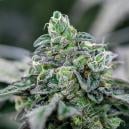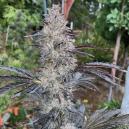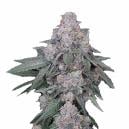Does Tobacco Make Marijuana More “Addictive?”
Published :
Nov 21, 2016
Categories :
Cannabis news

Is marijuana addictive? The answer remains inconclusive as many countries globally are on the brink of legalization of some kind. The answer, for now at least, still seems to be who is posing the questions and how. In the U.S., the National Institute on Drug Abuse (NIDA) continues to come down on the side of addiction. Right now, as state after state continues to legalize and as Canada moves towards legalizing recreational use, this is a hotly contested topic.
In Europe, the conundrum is as complicated as anywhere else. Recently, researchers at the University College in London weighed in on the negative side of the column by coming up with a new twist. Their study, released this summer in England, has concluded that marijuana mixed with tobacco, which is a highly popular ingestion method particularly in Europe, lowers the motivation to quit using both.
Mixing Apples With Oranges?
“No Smoke Without Tobacco,” published in the Frontiers in Psychiatry Journal this summer, admitted upfront that cannabis is less addictive than tobacco. It also found that of the 33,687 users surveyed in 18 countries, those who used only cannabis rather than a mix of cannabis and tobacco were far more likely to seek professional cessation intervention. This is hardly surprising when one considers that a major reason that either nicotine or cannabis is used is to quell anxiety and or pain – and of the two, cannabis is the far more effective drug.
Researchers also noted that between 77.2% and 90.9% of European cannabis users mixed tobacco with cannabis while in other regions of the world, it was far harder to establish this kind of behavioural pattern. In Australia, only 51.6% of cannabis users also mixed it with tobacco. In the Americas, only 16.6% of Canadians, and 4.4% of those in the U.S. mixed the two. This usage pattern is partly cultural and partly economic. In most of Europe outside of the Netherlands, cannabis is not only more expensive, but there has been less of a crackdown on tobacco use (although that too is changing). Hash, which is also far more widely used in Europe, is also frequently mixed with tobacco.
This trend too may be changing regionally as of next year when Germany is expected to both reschedule cannabis as a legitimate medical substance and cover it under health insurance. The question of “addiction” within a medical context, not to mention “quitting” may also change in tone and tenor as a result.
The British study authors, in fact, also specifically suggested that alternative research should be conducted to encourage cannabis users rather than quitting altogether, to switch to alternative forms of use – including vaping. The academics helming the inquiry who also included researchers from the British National Health Service, the University of Queensland, and the reliably anti-cannabis King’s College of London, also specifically considered how users ingest cannabis when considering potential negative health impacts. Yet in what seems like a sea change in the way researchers are beginning to understand the reasons for cannabis use, Michael Lynskey, professor of Addiction at King’s said of the study, “Our results highlight the importance of routes of administration when considering the health effects of cannabis”.
By The Numbers
To the extent that there are any real answers if not culprits on the matter of addiction, the research that exists (which is far greater on tobacco than cannabis for obvious reasons) is very clear. Nicotine in tobacco is highly “addictive” because of its impact on bodily functions. It stimulates mental activity, blood flow and is believed to also reduce pain. In fact, the substance has been compared to heroine – with nicotine being the more addictive of the two. Compared to opioids – the main drug used to treat chronic pain, cannabis is now being found to not only be more effective but users also are able to stop using opioid-based painkillers after they transition to a cannabinoid regime. In fact, data from the United States shows dramatic reduction of fatal opioid overdoses – 25% - within one year after legalization in every state where medical use has been approved.
To the extent that unbiased studies have been conducted on the question of cannabis “addiction” thanks to the lingering stigma of the drug war, cannabinoids in general (and THC specifically) have been found to be far less “addictive” than either heroine or opioids. Despite a predetermination caused by study parameters and the way such studies are conducted, U.S. government funded researchers have concluded that only 9% of “cannabis users” (as a whole) show classic signs of “addiction”. To date, no study by any government funded entity has ever considered the question of “addiction” after separating those who use cannabis by itself ostensibly for "recreational" rather than “medical” reasons.
The authors of the recent British study even admit that “much of the research investigating cannabis and tobacco use suffers from being unable to detangle the association of cannabis with tobacco ... and there is a paucity of data available to detangle this.”
The Lesser of Two “Evils”
The question of “addiction” itself is a loaded question. The emergence of serious studies of cannabis as medicine are still in their infancy. To date, Israel leads the way on cannabinoid research, and the results so far are dramatic – and on a range of chronic conditions no other drugs are able to treat as effectively. In fact, last year, Israeli researchers found that cannabis use may dramatically slow the spread of cancer and shrink tumours. The question of “addiction” to any cannabinoid in this scenario, not to mention when the drug is used to control pain or stop the spasming caused by movement disorders is nothing short of ludicrous.
Medical doctors in every country, including in the EU, are also coming to the conclusion that cannabis, especially when used with medical supervision, is the most effective, least addictive medicine on the planet.
In the future, as marijuana as medicine becomes not only socially and medically accepted, the question of future studies may very well be not “is marijuana addictive?” but in fact, “how on earth did we ever remain so blind to the many benefits of regular if not more than once a day use?”






































